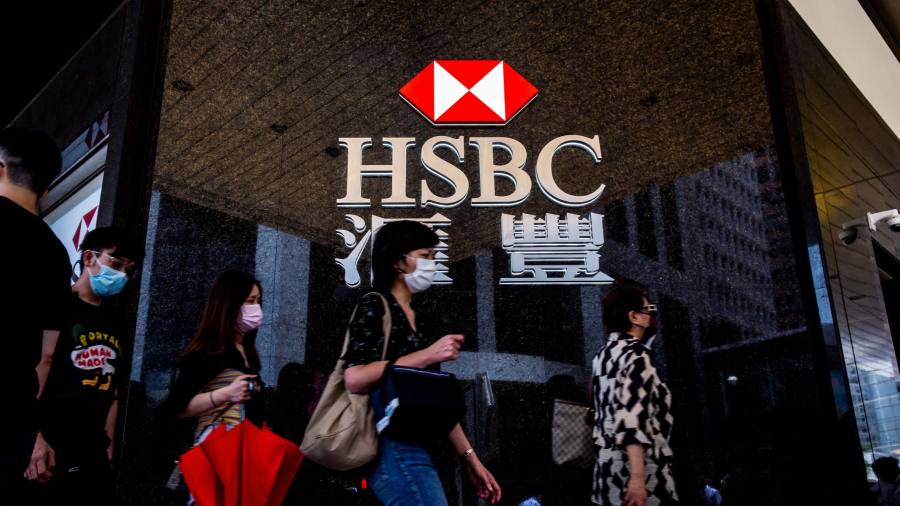Receive free HSBC Holdings PLC updates
We’ll send you a myFT Daily Digest email rounding up the latest HSBC Holdings PLC news every morning.
Two influential China hawks in the US Congress and UK parliament have accused HSBC of oppressing Hongkongers over pension rights if they want to emigrate, in a sign of the pressure on the bank as it straddles western and Asian markets.
Mike Gallagher, the US Republican representative and chair of the House China committee, and Alicia Kearns, the Conservative MP who heads the UK foreign affairs select committee, wrote to HSBC on Friday to express “deep concern” that the bank was barring some Hong Kong residents from making early pension withdrawals if they want to move abroad.
“We are concerned that HSBC — in support of the Hong Kong National Security Law — is withholding pension funds from BNO [British National Overseas] passport holders and thus contributing to the oppression of people in Hong Kong,” they wrote to HSBC chief executive Noel Quinn, in a letter obtained by the Financial Times.
The pressure from the lawmakers highlights how difficult it is becoming for HSBC to operate from twin bases in Hong Kong and the west as geopolitical tensions rise. The bank pulled out of US retail banking two years ago but depends on the US for its dollar-clearing licence, which is essential to its huge global trade financing business.
Following the 2019 pro-democracy protests in Hong Kong that led authorities to crack down on political expression, the UK introduced a visa scheme offering a pathway to citizenship to up to 5.4mn of the city’s residents who hold British National Overseas documents or are eligible for the emigration route as family members.
Beijing reacted by saying it would not recognise the BNO papers as official documents. The Hong Kong government then said residents availing themselves of the BNO visa scheme could not apply for early withdrawals from the territory’s compulsory retirement plan, the Mandatory Provident Fund (MPF).
Hong Kong residents can typically make an early withdrawal from the scheme if they make a “permanent departure” to resettle elsewhere, or in the event of early retirement or severe illness.
“In the case of permanent departure, scheme members are required to provide evidence of the right of abode outside of Hong Kong,” HSBC said. “The [regulator] has published guidance as to what evidence scheme members may rely on and, like all banks, we have to obey the law and the instructions of the regulators.”
HSBC is among a group of eligible financial institutions, which include Manulife and Invesco, that offer pension funds under the MPF retirement savings system.
The Hong Kong authority running the MPF scheme said the BNO was not considered a valid travel document and should not be used as evidence for early withdrawal of pension funds. A spokesperson added that trustees “have the duty to observe Hong Kong laws”.
Beijing imposed a contentious national security law on Hong Kong in 2020, which has driven tens of thousands of residents to leave for destinations including the UK, Canada, Australia and Taiwan.
In the UK, more than 90 MPs including former ministers signed a letter last month urging trade minister Dominic Johnson to press trustees including HSBC to allow Hong Kong residents in the UK access to their pension savings.
Hong Kong has blocked an estimated £2.2bn in pensions owed to roughly 96,000 people who moved to the UK in 2021 and 2022, according to the advocacy group Hong Kong Watch. About 30,000 people who moved abroad have applied for early withdrawals each year since 2020, according to government data.
In Friday’s letter, the lawmakers noted that the US passed legislation in 2020 enabling Washington to impose sanctions on persons who contributed to actions resulting in Beijing failing to live up to its commitments under the 1984 Sino-British Joint Declaration, which laid out the conditions of Hong Kong’s 1997 return to Chinese administration.
The lawmakers added that the national security law violated both the 1984 declaration and Hong Kong’s mini-constitution, known as the Basic Law.
Gallagher and Kearns asked HSBC to provide information on who had authorised the decision to not recognise BNO passports and whether board members had been aware of it.
They also asked if HSBC had communicated with China’s foreign ministry or Hong Kong’s government about the security law and the ban on using BNO documents to apply for pension withdrawals.
Read the full article here




